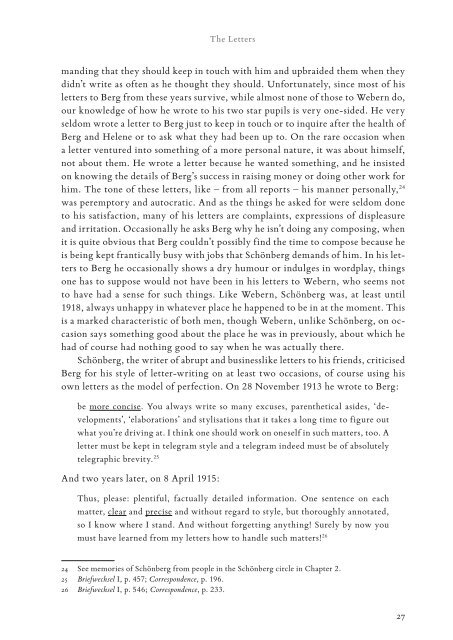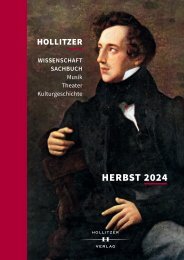Leseprobe_Three Men of Letters
You also want an ePaper? Increase the reach of your titles
YUMPU automatically turns print PDFs into web optimized ePapers that Google loves.
The <strong>Letters</strong><br />
manding that they should keep in touch with him and upbraided them when they<br />
didn’t write as <strong>of</strong>ten as he thought they should. Unfortunately, since most <strong>of</strong> his<br />
letters to Berg from these years survive, while almost none <strong>of</strong> those to Webern do,<br />
our knowledge <strong>of</strong> how he wrote to his two star pupils is very one-sided. He very<br />
seldom wrote a letter to Berg just to keep in touch or to inquire after the health <strong>of</strong><br />
Berg and Helene or to ask what they had been up to. On the rare occasion when<br />
a letter ventured into something <strong>of</strong> a more personal nature, it was about himself,<br />
not about them. He wrote a letter because he wanted something, and he insisted<br />
on knowing the details <strong>of</strong> Berg’s success in raising money or doing other work for<br />
him. The tone <strong>of</strong> these letters, like – from all reports – his manner personally, 24<br />
was peremptory and autocratic. And as the things he asked for were seldom done<br />
to his satisfaction, many <strong>of</strong> his letters are complaints, expressions <strong>of</strong> displeasure<br />
and irritation. Occasionally he asks Berg why he isn’t doing any composing, when<br />
it is quite obvious that Berg couldn’t possibly find the time to compose because he<br />
is being kept frantically busy with jobs that Schönberg demands <strong>of</strong> him. In his letters<br />
to Berg he occasionally shows a dry humour or indulges in wordplay, things<br />
one has to suppose would not have been in his letters to Webern, who seems not<br />
to have had a sense for such things. Like Webern, Schönberg was, at least until<br />
1918, always unhappy in whatever place he happened to be in at the moment. This<br />
is a marked characteristic <strong>of</strong> both men, though Webern, unlike Schönberg, on occasion<br />
says something good about the place he was in previously, about which he<br />
had <strong>of</strong> course had nothing good to say when he was actually there.<br />
Schönberg, the writer <strong>of</strong> abrupt and businesslike letters to his friends, criticised<br />
Berg for his style <strong>of</strong> letter-writing on at least two occasions, <strong>of</strong> course using his<br />
own letters as the model <strong>of</strong> perfection. On 28 November 1913 he wrote to Berg:<br />
be more concise. You always write so many excuses, parenthetical asides, ‘developments’,<br />
‘elaborations’ and stylisations that it takes a long time to figure out<br />
what you’re driving at. I think one should work on oneself in such matters, too. A<br />
letter must be kept in telegram style and a telegram indeed must be <strong>of</strong> absolutely<br />
telegraphic brevity. 25<br />
And two years later, on 8 April 1915:<br />
Thus, please: plentiful, factually detailed information. One sentence on each<br />
matter, clear and precise and without regard to style, but thoroughly annotated,<br />
so I know where I stand. And without forgetting anything! Surely by now you<br />
must have learned from my letters how to handle such matters! 26<br />
24 See memories <strong>of</strong> Schönberg from people in the Schönberg circle in Chapter 2.<br />
25 Briefwechsel I, p. 457; Correspondence, p. 196.<br />
26 Briefwechsel I, p. 546; Correspondence, p. 233.<br />
27














